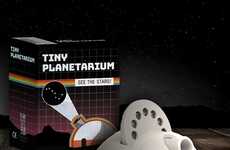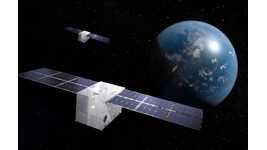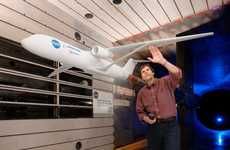This Mini Satellite Would Cost Less Than a $1000 to Deploy To Space
Rahul Kalvapalle — April 8, 2016 — Tech
References: asunow.asu.edu & gizmag
The SunCube FemtoSats are exceptionally innovative and well-designed mini satellites, developed by a group of students over at Arizona State University, that is designed to make space travel a much more compact affair whilst also reaping significant savings, ultimately allowing greater access to the space exploration realm.
Each of these mini satellites is equipped with its own data collection, propulsion and communication systems and is powered by solar power. What's great about this mini satellite project is that the modules were made out of easily available off-the-shelf components. This proves that any university, lab or hobbyist group can make their own mini satellite.
Ultimately, this mini satellite project is bidding to make space science more accessible to people and groups who may not have the funds of your typical space agency.
Each of these mini satellites is equipped with its own data collection, propulsion and communication systems and is powered by solar power. What's great about this mini satellite project is that the modules were made out of easily available off-the-shelf components. This proves that any university, lab or hobbyist group can make their own mini satellite.
Ultimately, this mini satellite project is bidding to make space science more accessible to people and groups who may not have the funds of your typical space agency.
Trend Themes
1. Mini Satellite Deployment - The development of low-cost and compact mini satellites provides opportunities to disrupt the traditional space industry structure and expand access to space exploration.
2. Off-the-shelf Component Use - The utilization of easily accessible off-the-shelf components in the construction of mini satellites creates opportunities for disruption in the space industry, as well as potential cost savings.
3. Student-led Innovation - The participation of students in space technology development presents opportunities for innovation and cost savings in the space industry.
Industry Implications
1. Space Exploration and Research - The development of low-cost and accessible mini satellites can disrupt the traditional hierarchy of the space exploration industry, allowing more diverse groups to participate and innovate.
2. Education - The incorporation of student-led innovation in space technology development presents opportunities for technological and educational disruption, potentially leading to new career paths or innovation across multiple fields.
3. Electronic Components and Manufacturing - The development of mini satellites using accessible off-the-shelf components allows for the potential expansion of the electronic components and manufacturing industries in space exploration and research.
0.7
Score
Popularity
Activity
Freshness






















